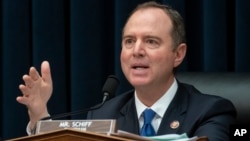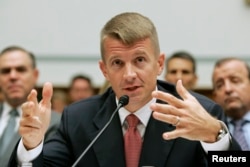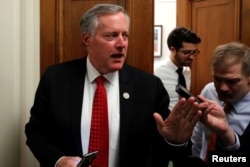A U.S. congressional committee on Tuesday formally asked the Justice Department to investigate Trump backer Erik Prince for possible crimes, charging he made repeated false statements under oath to U.S. lawmakers probing Russia's 2016 election interference.
The Democratic-run panel's request represented the latest shot fired in an escalating battle between congressional Democrats and the Trump administration over findings of the report that Special Counsel Robert Mueller released on April 18.
Perjury before Congress is a crime that can carry a punishment of up to five years in prison and a fine.
In a letter to Attorney General William Barr, House Intelligence Committee Chairman Adam Schiff said that Prince's "false statements" impaired the panel's efforts to "fully understand" Russia's meddling and develop remedies to "counter future malign operations."
Russia denies interfering in the election in which President Donald Trump, the Republican candidate, defeated his Democratic rival Hillary Clinton.
"We refer this matter to the (Justice) department to consider whether criminal charges should be brought," Schiff wrote.
"I believe there was very strong evidence that he (Prince) willingly misled the committee, made false statements to the committee," Schiff told a Washington Post event earlier on Tuesday, citing a January 2017 meeting between Prince and a Russian banker in the Seychelles. "The evidence is so weighty that the Justice Department needs to consider this."
The Department of Justice declined to comment.
At issue are discrepancies between Prince's testimony to Schiff's committee in November 2017 and what Mueller's report detailed about Prince's contact with Kirill Dmitriev, who reports directly to Russian President Vladimir Putin as head of Russia's sovereign wealth fund.
In the letter to Barr, Schiff said the committee identified "six different categories of materially false statements" by Prince.
Those statements, he wrote, included Prince telling the panel that he and Dmitriev had one chance encounter when both were staying at the same Seychelles hotel, whereas the Mueller report said an adviser to the ruler of the United Arab Emirates arranged for them to meet and that they saw each other twice.
Schiff charged that Prince also misled the panel about the topics of the pair's discussions, including setting up a U.S.-Russia communications channel, and that Prince told lawmakers he did not brief former Trump aide Steve Bannon about the meetings with Dmitriev, whereas the Mueller report said he did.
Matthew L. Schwartz, a lawyer for Prince, rejected Schiff's allegations.
There "is nothing new here for the Justice Department to consider, nor is there any reason to question the special counsel's decision to credit Mr. Prince and rely on him in drafting its report," he said in a statement.
Prince "cooperated completely" with Mueller's investigation, said Schwartz, a partner at the firm of Boies, Schiller, Flexner, LPP.
Separately, Prince has been pushing a plan to deploy a private army to help topple Venezuela's socialist president, Nicholas Maduro, four sources with knowledge of the effort told Reuters.
U.S. Representative Mark Meadows, head of House Republicans' Freedom Caucus, separately told the Post event that Republicans were considering sending their own criminal referrals for two to three individuals. He declined to name them or give many details, but said two of them were linked to Fusion GPS.
Fusion GPS is a research and intelligence consultancy that hired former British intelligence officer Christopher Steele to investigate Trump and Russia.
"There are two or three individuals that we believe could have potentially given false testimony to Congress," said Meadows, a member of the House Oversight and Government Reform panel. That committee and the Intelligence Committee are among several congressional panels examining Russian interference in American politics, including in the 2016 presidential election.
Meadows added that Trump had not personally encouraged House Republicans to make any referrals to the Justice Department over congressional misstatements, and that he had not spoken to the president about the issue "from a criminal referrals standpoint."








